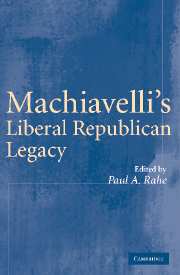Book contents
Introduction: Machiavelli's Liberal Republican Legacy
Published online by Cambridge University Press: 24 July 2009
Summary
The contributors to this volume are debtors. They work in a field that others opened up, cleared, and to a certain extent tilled before most of them even came on the scholarly scene. Their creditors in this particular regard are, as one would expect, numerous – but five of these stand out.
The first is a scholar named Zera Fink. Some sixty years ago, in 1945, as the Second World War came to an end, he published a slender volume entitled The Classical Republicans: An Essay in the Recovery of a Pattern of Thought in Seventeenth-Century England, which he characterized as “a chapter in the history of ideas.” Fink's book was a pioneering work aimed at establishing the Machiavellian character of much of the thinking inspired by England's abortive republican experiment and at clarifying its overall significance.
Fourteen years after the appearance of Fink's work, Caroline Robbins brought out The Eighteenth-Century Commonwealthman: Studies in the Transmission, Development and Circumstance of English Liberal Thought from the Restoration of Charles II until the War with the Thirteen Colonies, a no less seminal book that took up the story of English radicalism at almost precisely the point where Fink left off. Eight years later, Bernard Bailyn presented to the world The Ideological Origins of the American Revolution, a work of comparable significance, which traced the influence on the American colonists of the 1760s and 1770s of the thinking of Fink's seventeenth-century classical republicans and Robbins's eighteenth-century commonwealthmen.
- Type
- Chapter
- Information
- Machiavelli's Liberal Republican Legacy , pp. xix - xxxPublisher: Cambridge University PressPrint publication year: 2005
- 5
- Cited by



